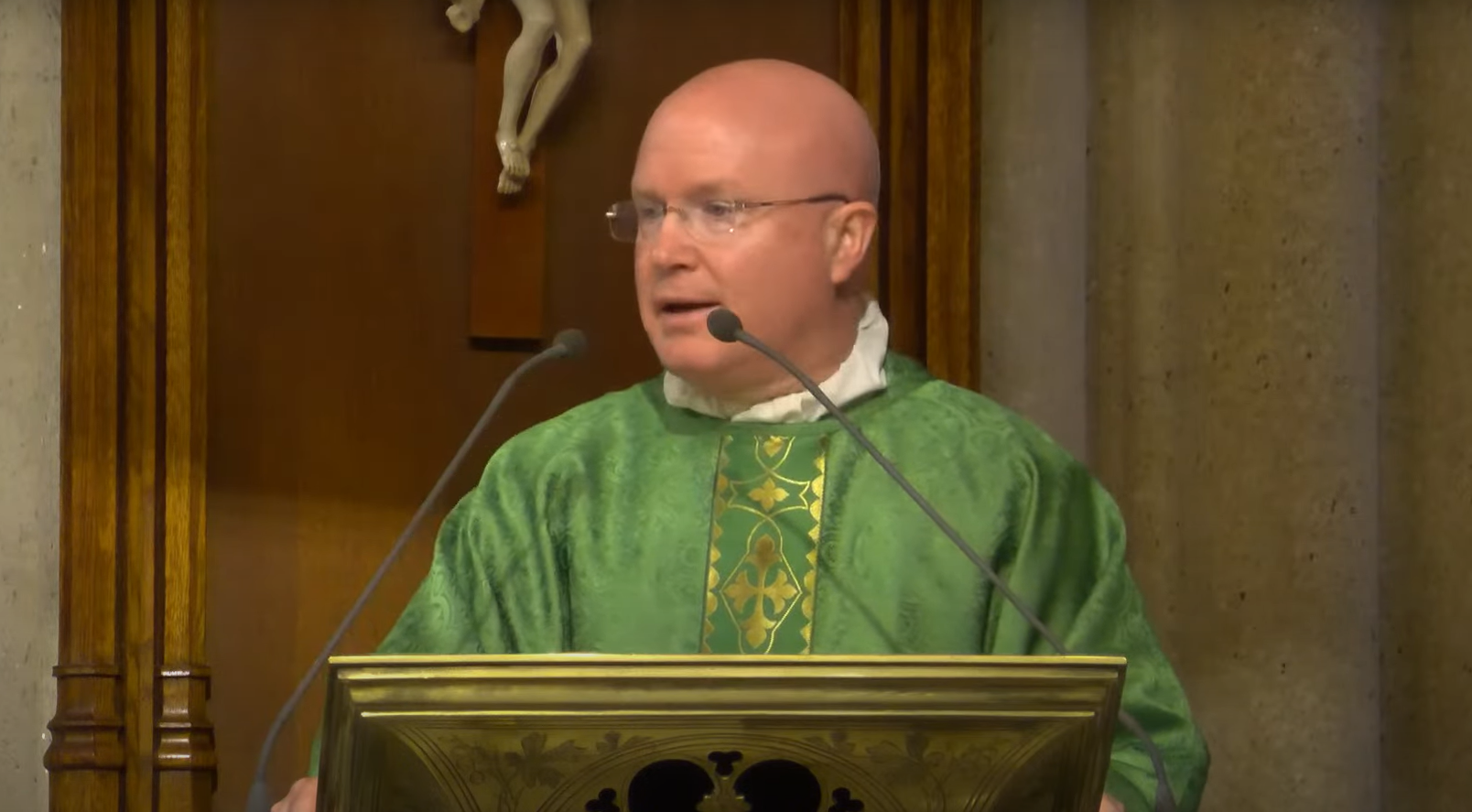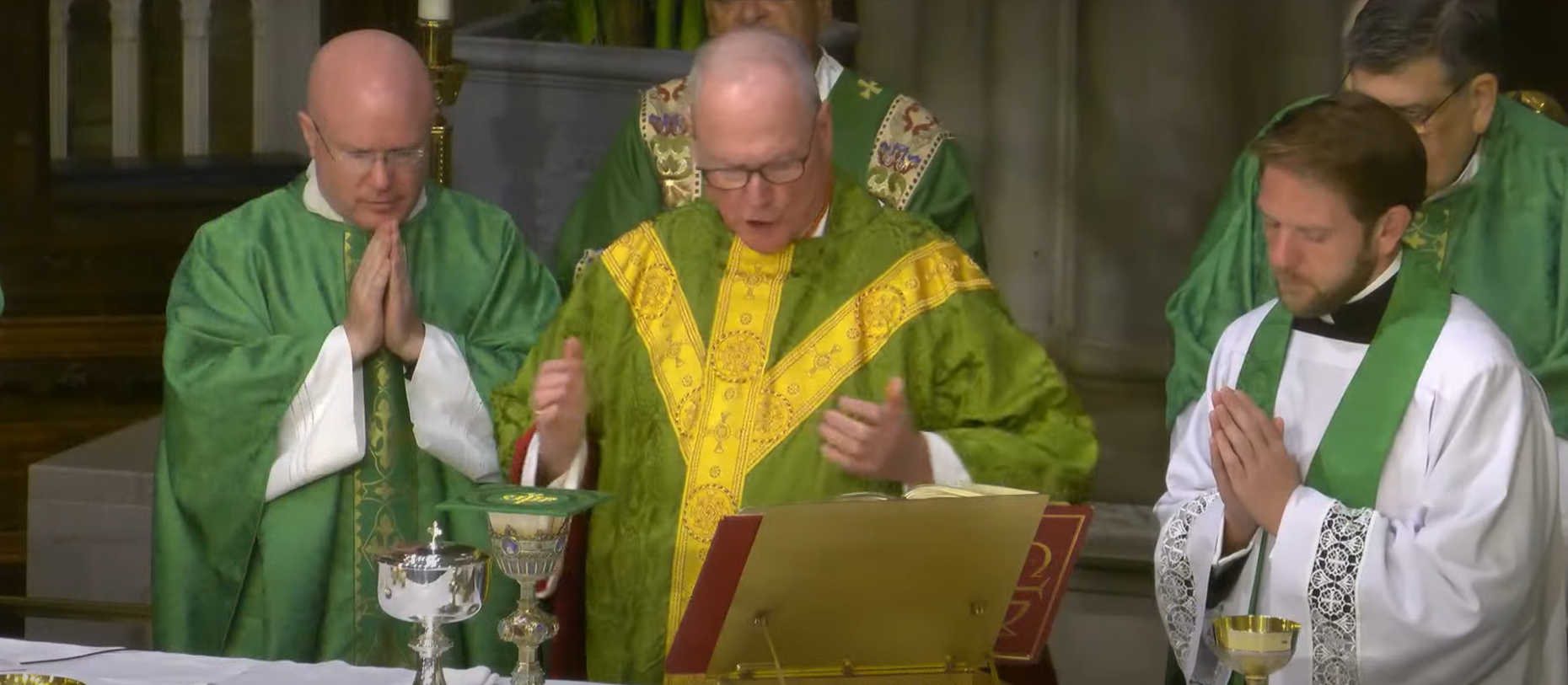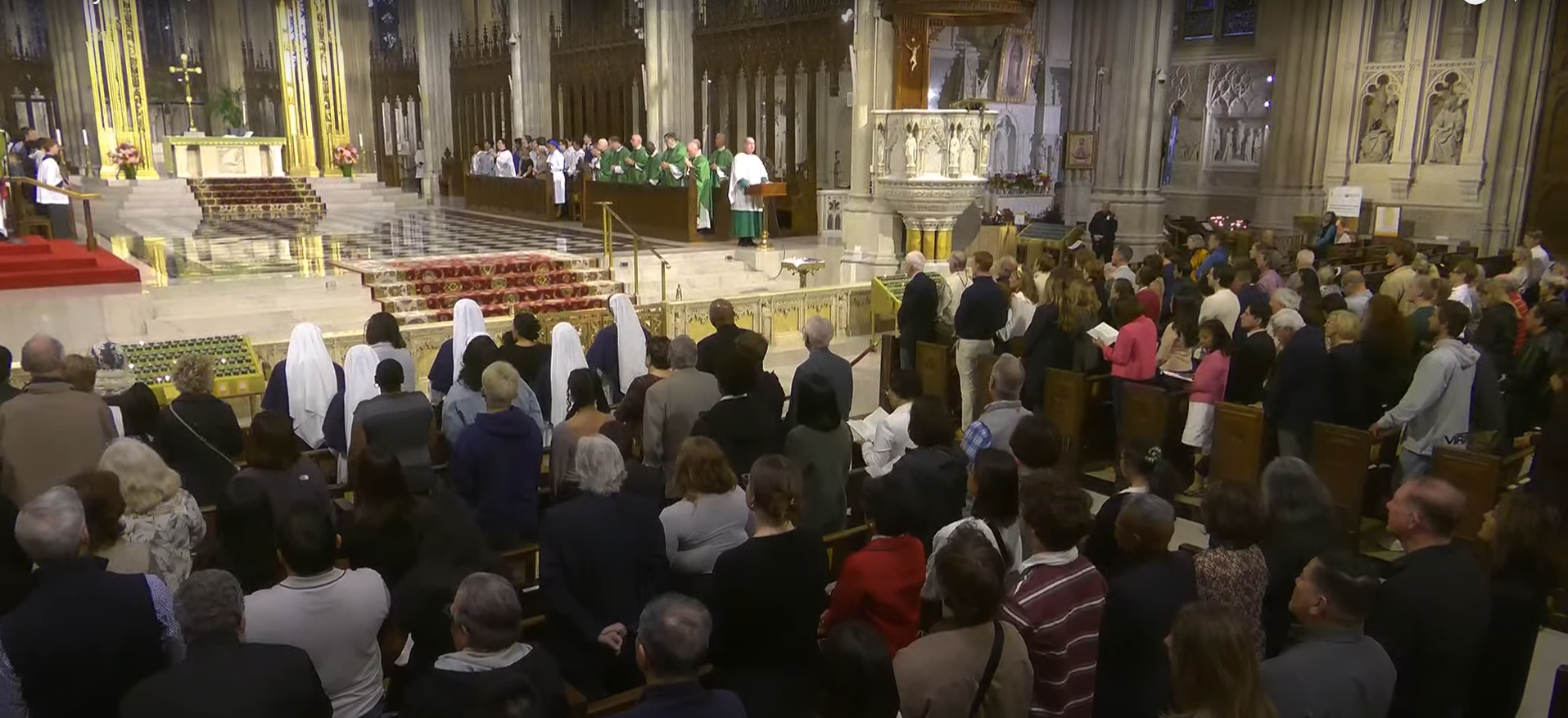
This past Sunday, Father Roger Landry, the newly appointed National Director of The Pontifical Mission Societies (TPMS) in the United States, delivered a powerful and inspiring homily at the Cathedral of St. Patrick. His message centered on the importance of World Mission Sunday, a day dedicated to raising awareness and support for the missionary work of the Church across the globe. Watch the video below to listen to it!
The following text guided the homily:
Today is World Mission Sunday and what a joy it is to be here in this Cathedral dedicated to St. Patrick, the heroic missionary of Ireland. It’s from this exquisite house of God that vigorous missionary outreach takes place every day to those who live and work in Manhattan as well as to the over five millions of visitors, from various countries, religions and backgrounds, who enter each year. It’s here, today, that we have a chance to focus on the call Jesus gives us in the Gospel today to become truly great through sharing in his mission for the salvation of the world.
My name is Father Roger Landry and I’m the new National Director of the Pontifical Mission Societies in the United States, which includes the Society of the Propagation of the Faith, the Missionary Childhood Association, the Society of St. Peter and the Apostle and the Missionary Union of Priests and Religious. All four are part of the Catholic Church’s global missionary outreach, tasked with spreading our faith through developing in every baptized person a missionary spirit, rooted in prayer, sacrifice and charity. In union with the Holy Father through the Vatican’s Dicastery for Evangelization, we help make possible the Church’s proclaiming the Gospel to those who don’t yet know Jesus Christ or where the Church is too young, too poor, or too persecuted to be self-sufficient.

Father Roger J. Landry celebrating Mass with Cardinal Timothy Dolan on World Mission Sunday.
I’m so grateful to Cardinal Timothy Dolan, the chairman of the Board of the Pontifical Mission Societies USA, for his invitation to preach here from this pulpit where my predecessor for 16 years, the Venerable Archbishop Fulton J. Sheen, would powerfully proclaim the Gospel not just to New York but to the world. I thank Msgr. Marc Filacchione, the Director of the Archdiocese’s Society of the Propagation of the Faith office, and his entire team for their hard work each year in catalyzing Catholics throughout the Archdiocese of New York to respond so generously in support of the Church’s worldwide missionary efforts. I thank all of you here today for living out your Catholic faith on the Lord’s day and your commitment to help share the Word of God and the Word-made-flesh with people everywhere who need Jesus just as much as we do.
Today in the Gospel, there’s a conversation about ambition. Jesus had just announced to the apostles, “We are going up to Jerusalem, and the Son of Man will be handed over to the chief priests and the scribes, and they will condemn him to death and hand him over to the Gentiles who will mock him, spit upon him, scourge him, and put him to death, but after three days he will rise.” Jesus was indicating that he would fulfill the prophecies foretold by Isaiah, part of which we hear in today’s first reading, that God’s suffering servant would be “crushed in infirmity,” “give his life as an offering for sin,” endure “affliction,” and “through his suffering … [bear] their guilt.”
In response to these disturbing predictions, the apostles James and John approach Jesus and ask, not how Jesus is handling it or how they might help, but, with great chutzpah and self-interest, for a promotion and a blank check: “Teacher, we want you to do for us whatever we ask of you.” Jesus patiently and nobly indulges them by asking, “What do you wish me to do for you?” And they retort, “Grant that in your glory we may sit one at your right and the other at your left.” The two fishermen wanted to be the Messiah’s right and left hand men, his two viceroys or executive vice-presidents, in what they anticipated would be Jesus’ glorious Messianic administration. To get a sense of the ugliness of the brothers’ selfish jockeying for position, imagine that your father came to you and told you that the doctor had just given him two weeks to live and, instead of consoling him, instead of even showing that you cared about him, you and your siblings immediately shifted the attention to who would get the house and the car. The behavior of the sons of Zebedee was raw ambition at its most disgusting. Jesus responded with magnanimity and mercy, “You do not know what you are asking,” and then gave them yet another indication of the expectation-shattering type of kingdom he had come into the world to establish: “Can you drink the cup that I drink or be baptized with the baptism with which I am baptized,” alluding to the chalice of suffering prophesied by Isaiah and the cleansing ablution of blood that would pour forth from his wounds on Good Friday. To his question, the brothers impetuously respond, “We can!” Jesus then foretold that they ultimately would indeed drink that cup of suffering, but reminded them that God the Father had already prepared those who would sit at his right and left, which would be the Good and Bad Thief on Golgotha, the sheep and the goats at the General Judgment, and likely Mary and Joseph in heaven.
Hearing this conversation, however, the other ten apostles objected and became angry at James and John, not because of the brothers’ impudence, but out of jealousy: they themselves wanted the positions that the brothers had the guts to request. Their anger gave Jesus the opportunity to give one of the most important instructions to them and to us about the path to greatness, about the means to become like him, about the way to reign with him and advance his kingdom. Jesus knows what is in the human person. As the Letter to the Hebrews tells us today, “We do not have a high priest who is unable to sympathize with our weaknesses, but one who has similarly been tested in every way yet without sin.” And so, conscious of his apostles’ human imperfections, he didn’t seek to suppress their ambition but to reorient it. Jesus wants us to be great, not mediocre, but desires to convert our ambitions so that we will be desirous of truly great things. He wants to transform our hunger for self-aggrandizement to an ambition for souls, between seeking to glorify our own name, establish our fiefdom and do whatever we wish to trying to hallow God’s name, enter and establish his Kingdom, and accomplish his holy will.
So he tells the twelve: “You know that those who are recognized as rulers over the Gentiles lord it over them and their great ones make their authority over them felt.” It’s still much the same way today. Greatness is determined by how much power one wields in politics, how much money or influence one has in business, how many magazine covers and social media followers one has in entertainment. Greatness seems determined by the capacity to command or lead others from above. Jesus says that that’s not the way of his kingdom. “Whoever wishes to be great among you,” he states emphatically, “will be your servant. Whoever wishes to be first among you will be the slave of all.” Real greatness would not be determined by fighting for seats at tables, but by fighting for the towel. The highest would not be the one to whom others would lift glasses in toasts but the one who would be able to drink the cup of Christ’s blood and in turn say to others with Christ, “This is my blood, poured out for you.” Christ’s cabinet would be filled not by those who would kiss his butt, but by those who would put their own butts on the line for Him and for others, by being baptized into Christ’s death through their own suffering and death. He summarizes everything by referencing to his own intention and actions as King: “For the Son of Man did not come to be served but to serve and to give his life as a ransom for many.” To be great, in other words, would come not principally through coveting and sharing Christ’s power, but by emulating and extending his sacrificial love.
Jesus’ words about greatness ought to have a particular resonance here in New York City, which is a place where so many work so hard to become great by worldly standards on Wall Street, on Broadway, in Madison Square Garden, on Park, Madison and Fifth Avenues and beyond. It’s a city of skyscrapers ascending constantly higher. Jesus today wants to transform that boundless energy toward something truly lasting. If it were ugly for the apostles to try to elbow each other for worldly advancement, ignoring the reality and meaning of Jesus’ upcoming passion, death and resurrection, how much uglier it is for us now to remain only at the level of worldly desires after those predictions have all come true. The Son of God made man was crucified not so that we might zealously seek the things of this world in the same way everyone else does. He died and rose so that we might live a new life, in the world but not of it, seeking first the kingdom of God and God’s holiness, recognizing that everything else of true value will be given us besides. He was murdered on Golgotha and rose not so that we could be mediocre in faith and average in life, but so that we could be great.
One way that Jesus wants us to become truly great is with respect to sharing the treasure of our faith and completing the vocation and mission he has given us to go and proclaim the Gospel to every creature, baptizing them and teaching them everything he has taught us (Mt 28:18-20). The theme of World Mission Sunday today is taken from Jesus’ words in St. Matthew’s Gospel, “Go and invite everyone to the banquet!” (Mt 22:1-24). In a letter he sent to Catholics throughout the world in anticipation of this celebration, Pope Francis said, “Mission is a tireless going out to all men and women, in order to invite them to encounter God and enter into communion with him.” Jesus, the Good Shepherd, is interested in every lost sheep who has wandered from him and his fold. He wants us to share his love. We know that only 2.5 of 8 people on the planet is Christian, and only 1.3 of 8 is Catholic. Of the Catholics in our country, only 1 of 6 comes to worship the Lord each Lord’s day. The vast majority of the human race, 2,000 years after Christ entered the world and gave his life to save ours, is not coming to the banquet Jesus himself hosts here out of love each Sunday. And Jesus is summoning each of us to be passionate, zealous, indeed great in going out to invite everyone to this feast. He wants us to be as fired up as St. Francis Xavier was to convert three whole countries. He wants us to be as committed as St. Isaac Jogues — one of the North American martyrs, the first priest ever on this island, whose image is on the front door of this Cathedral — who was willing to suffer so much in order to plant the seeds of the Gospel in New York and who watered those seeds by his own shed blood. He wants us to be as dedicated as the Little Flower, St. Therese, was in praying and offering her sufferings for the missionary priests she had adopted and for the fruitfulness of their work. He wants each and every one of us to be as all-in, within our own circumstances, as so many missionaries are in 1,150 missionary territories across the globe, and just as much as the young FOCUS missionaries are on the university campuses here in this city.
What are we called to do practically? First Jesus calls us to pray. He asks us to look out and see that the fields are white and ripe for the harvest and to pray to the Harvest Master for laborers for his harvest. We pray not only for those already on mission, and not just for vocations for future missionaries, but for ourselves that we might all recognize that by our Baptism we and the whole Church are a mission on this earth. We remember that as soon as Jesus asked his disciples to pray to the Harvest Master, he then from those praying called Simon Peter, Andrew, James, John and the others. We’re, therefore, not just praying for others to do the work, but also for ourselves to respond faithfully and fully to God’s call.
The second thing we’re summoned to do is to live out our mission. In the 16th century, when St. Philip Neri read St. Francis Xavier’s letters describing how much work and fruit he had baptizing people by the tens of thousands in India, he wanted to leave Rome and go help him. But his wise spiritual director told him, “Rome will be your Indies.” And Philip became the great apostle bringing Rome back to the faith. We need to grasp that, for most of us, New York is our Indies, that our workplace, our apartment building, our university, even our sidewalks, subways, coffee shops, parks and arenas, are all meant to be our mission field, and that we need to approach it like St. Francis Xavier appoached, India, Indonesia and Japan, Philip Neri approached Rome, Isaac Jogues approached French Canada upstate New York, and St. Frances Xavier Cabrini approached the Italian sections of New York City in its infancy.

Mass at St. Patrick’s Cathedral in New York City, celebrating WMS
The third thing is to grasp that this is a mission we live in communion. Jesus didn’t send out the apostles solo, but two-by-two, even though they could have covered twice as much as ground if he said sent them independently. Likewise he gave the great commission to the whole Church, so that we, helped by the Holy Spirit at Pentecost, might collaborate in this mission. That means, first, we must grasp that we are being helped in our task by so many others praying for us, strengthening us like here at Mass this morning, and working alongside of us for the Gospel wherever we are and go. But it also means that we need to be conscious of all our co-workers for the Gospel.
The Pontifical Mission Societies trace their origins to Blessed Pauline Jaricot, a laywoman in France whose brother Phileas was a missionary, who 202 years ago began to gather people together to offer daily prayer and sacrifice each week a sou, the equivalent of a penny, to support the Church’s missionary work. From the very first collection she took up, she gave a sizeable portion of it to support the then vast Diocese of Louisiana, which stretched from the Florida Keys to Canada, as well as to the missions in Kentucky. Her investment paid great dividends in support of those spreading the Catholic faith in what would become a huge part of the United States of America. Now U.S. Catholics are being asked, with those in Churches across the globe, to help plant, grow and strengthen the faith in 1,150 territories like the Diocese of Louisiana was two centuries ago. If all you can afford is a penny, the Pontifical Mission Societies will gratefully receive it. If God has blessed you with the capacity to give more than that, I promise you we will be good stewards of your generosity. The second collection today will be for that purpose.
The Lord is asking us to be great, to be ambitious in the right way, in inviting everyone to the feast by our prayers, by our own missionary apostolate, and by helping make possible the Church’s faithfully fulfilling Jesus’ mandate to go and teach all nations. May each of us respond to that holy calling and blessed task!
The greatest means Jesus gives us to become great is the Mass, our participation in time in the eternal offering of Christ in the Last Supper and on Calvary. In the Upper Room, Jesus showed just how much he had come not to be served but to serve by kneeling down to wash his apostles’ feet, but he was just getting started. Later he would abase himself further, changing bread and wine into his body and blood so that we, his servants, could consume him and live off of him. Here he simplifies everything he’s taught us about the path to true greatness in the words he will say again to us in a few minutes: “Do this in memory of me!,” inviting us to give our body, our blood, our sweat, our tears and even our time, talents and treasure out of love for him and others. And he asks us, “Can you drink the chalice that I am going to drink?” As we prepare to lift up this chalice to the Lord on World Mission Sunday, may we with courage, holy ambition and God’s grace, respond like James and John ultimately did, saying, “We can!,” and go out after Mass with God’s blessing and command to “go and announce the Gospel of the Lord” as we labor together to invite everyone to this saving banquet of the Lamb.


